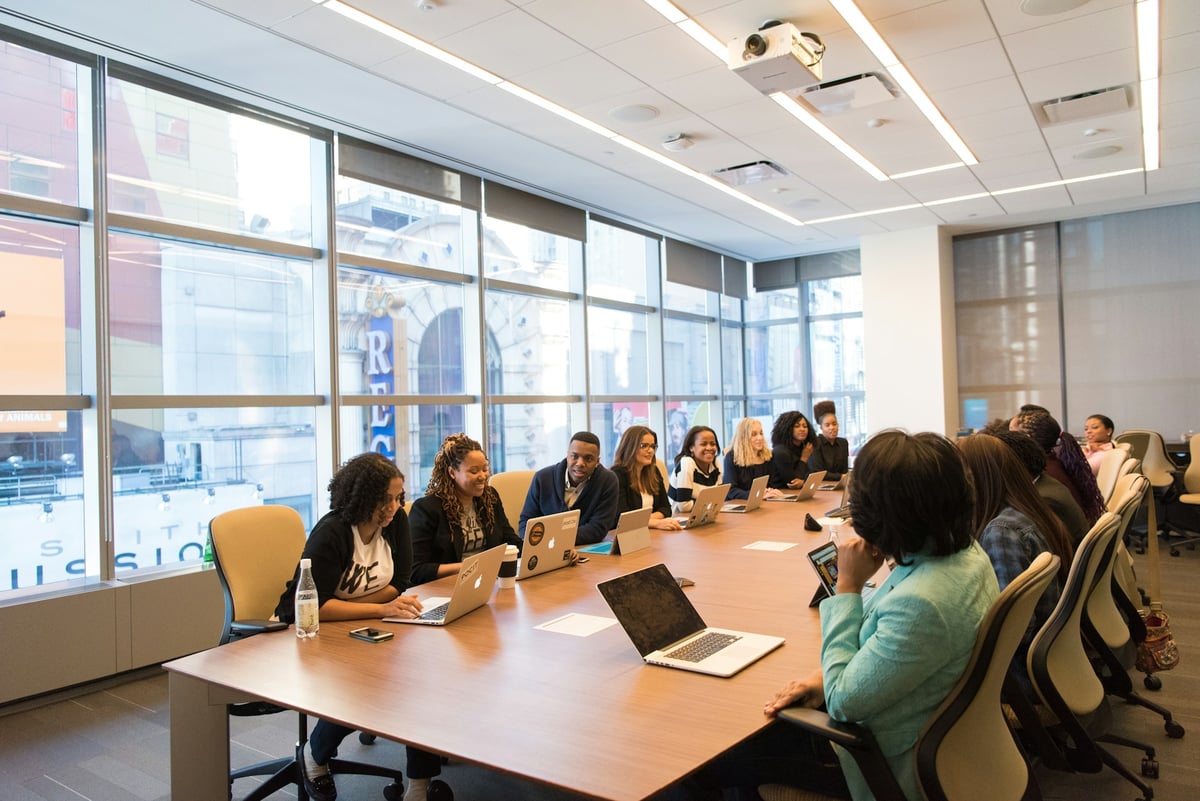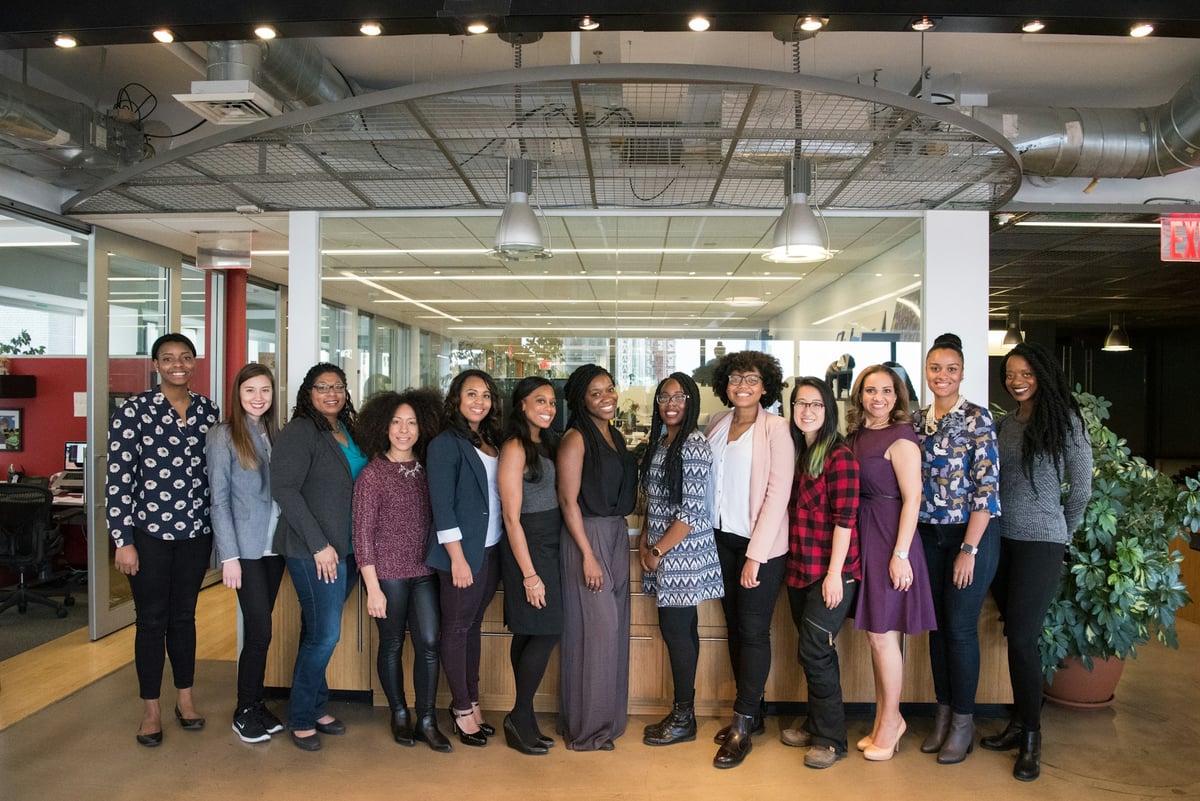Okay, let's be honest – you hear "DEIB" thrown around all the time, and it's probably starting to feel like a buzzword at this point. However, if you're looking to grow a tech company, progress your tech career, or, in other ways, build or work with a team, this is more than just a feel-good concept.
It's about fairness, sure, but it's also about building stronger teams, smarter products, and a workplace where you actually want to be each day. Implementing DEIB initiatives is crucial for fostering a culture of belonging and innovation within tech companies, setting the standard for ethnically diverse companies moving forward.
Think of DEIB like this: it's about making sure everyone with amazing tech skills has a real chance to use them. It's about an office where your unique perspective is valued, not ignored. And it's about feeling like you're part of something bigger, not just a cog in the machine.
By integrating DEIB practices into our hiring process and training, we build stronger, smarter teams and products by leveraging diversity, equity, inclusion, and belonging.
Sound good? In this guide, we're breaking down precisely what DEIB means (and what it doesn't). We'll talk about why it makes a difference for your career, your team, and the whole industry.
And yeah, we'll give you some ways to actually DO something about it, not just talk.
Let's dive in!
Okay, But What is the Actual DEIB Meaning?

Let's ditch the textbook definitions for a second. Imagine DEIB like building the ultimate tech team…
- Diversity: It's having the coder who grew up in rural India, the brilliant woman who uses a wheelchair, the guy who didn't go to a fancy college, and ensuring we recruit and support diverse employees from all walks of life – all working on the same project. See all those different viewpoints? That's where the magic happens. By fostering a team with diverse talent, we unlock unparalleled innovation and problem-solving capabilities.
- Equity: Everyone gets the tools to succeed, no matter their background. Maybe that's an experienced mentor for the new hire, English classes for someone still learning, or childcare options for working parents. It's leveling the playing field, not just saying "good luck!"
- Inclusion: Picture a team meeting where everyone feels safe to share ideas, weird ones included. It's when celebrating Diwali and Hanukkah means just as much as company pizza parties. Nobody feels like an outsider.
- Belonging: This is where it gets awesome. It's more than not being mistreated – it's feeling like you're truly part of something. Having a diverse workforce is key to this feeling, as it fosters a sense of belonging and team cohesion. Maybe it's inside jokes after a crunch or how your team backs you up when a project goes sideways. That's belonging.
Why Does Any of This Matter to Tech People?
Simple: Because a team that feels this way builds better stuff, solves tougher problems, and honestly… has more fun doing it. And let's face it, we all spend too many hours with our coworkers to have it suck. Companies that prioritize DEIB and make sure it's done right changes that.
Prioritizing DEIB not only fosters a more inclusive and welcoming environment but also significantly boosts employee engagement, leading to a more motivated, satisfied, and productive workforce in the tech industry.
Why a Diverse Workforce and DEIB Makes Tech Companies Stronger (From the Code to the Bottom Line)

Okay, skeptics, listen up. DEIB isn't political correctness gone wild. It may sound woke at first, but it's more than that. It's about building products people actually want, attracting talent, and keeping those star employees from jumping ship. Think of it this way:
- Innovate or Die: Ever worked on a project where everyone seemed to have the same ideas? Diverse teams shake things up. Someone who grew up on a farm might approach a user interface totally differently than a city-raised coder. Those clashes of ideas lead to breakthroughs. Boring teams build boring products.
- Numbers Don't Lie: Companies with actually diverse leadership make more money. Not just a feel-good stat – it's cold, hard cash from new ideas that sell. This success is not just financial; it's about creating an equitable workplace that champions fairness and opportunity for all employees, enhancing creativity and innovation across the board.
- Stop the Brain-Drain: When people don't feel valued, it's not just bad vibes in the office… it's your competition poaching your best people. Equity (fairness) and inclusion (feeling like you belong) mean higher retention rates. That's huge in a tight tech job market. By fostering an inclusive workplace, companies ensure that all employees feel respected, valued, and supported, further strengthening the organization.
- Forget "Employee", Think "Tribe": When a workplace feels safe enough to be yourself, people work harder and stick around longer. It's that hard-to-define sense of belonging – think celebrating successes as a team, not just a bunch of individuals.
DEIB done right isn't charity, it's an investment. Happy, diverse teams build the future of tech. Period.
DEIB Roadblocks in Creating an Inclusive Environment (and How to Smash Them)

Implementing DEIB isn't always a smooth ride. Let's be real about the hurdles many tech companies face and how to flip those challenges into serious wins:
- Robot Bias: AI is supposed to be all smart and logical, right? Wrong. Since humans code it, it inherits our biases. That can mean an algorithm weeding out job applicants unfairly or a product feature not working as well for some people as others. The fix? Diverse teams building and testing AI are critical. Think of it as the ultimate bug-hunt – only it's way more important than fixing the latest interface glitch. Incorporating employee resource groups in the AI development and testing process can involve diverse perspectives, ensuring a more inclusive and equitable technology outcome.
- The "We've Always Done It This Way" Crowd: Change is hard, especially when people in power don't see the problem. Workshops and open talks can win people over, but sometimes, you'll be the one leading the charge, even when it's uncomfortable. Remember, pioneers aren't always popular at first…
- Where Does Everyone Fit In? Tech still has a representation problem, especially at the top. This isn't about pity hires. It's about recognizing talent gets overlooked, then fixing that. Mentorship programs, taking a hard look at who you promote, seeking out candidates beyond the usual places – all part of the solution.
- Show Me the Results! Some people want a spreadsheet to prove DEIB works. While the "feels" are important, you gotta collect data, too. Tracking things like diverse hires, how long people stay, satisfaction surveys – this paints a clear picture. It also shows where you need to improve, making it honest, not just lip service.
Overcoming these barriers shows your company isn't afraid to do the hard work. That makes you attractive to the best talent, gets clients happy to support you, and yeah, it's the right thing to do – but the business benefits are very real.
By ensuring DEIB efforts address the needs and barriers faced by the entire workforce, you foster a culture of respect, acceptance, and inclusivity that benefits everyone.
DEIB Wins: Companies Creating an Equitable Workplace
Enough talk; let's see DEIB in action! Here are some tech companies making a serious difference – and how you can take notes for your own team or company:
- Google: Inclusive by Design: Ever use a product and feel like it wasn't made for someone like you? Google fights this by constantly testing if its tech works as well for everyone, including considerations for higher gender diversity, national origin, and sexual orientation. This means teams thinking hard about the needs of a wider range of users… which leads to simply BETTER products.
- Salesforce: The Power of the People: They let employees form groups based on shared interests, cultures, etc. They call them "Equality Groups" and they do more than just social stuff - they push for change, educate the company, and make everyone feel included, especially emphasizing support for employees of diverse mental and physical ability. Proof it's not all top-down; you can spark this from the ground up.
- Intel: Equal Pay, No Lip Service: They made news for making sure everyone gets paid fairly, regardless of gender – a massive deal in tech! The key is they don't just say they did it once…they constantly check to MAKE SURE it stays that way, with a keen focus on including individuals of all physical abilities in their equality and pay equity efforts. That's a real commitment.
- Slack: Untapped Talent: Their apprenticeship program trains people who've been in jail to get tech jobs. This isn't just nice; it's smart! They're finding great employees others overlook and making a difference in people's lives. Who on your team has that hidden potential?
This isn't about copying these exact diverse workforce programs. It's about seeing how different companies take real action, not just talk. Think of what makes sense for your workplace, and get creative!
You Can Be the Change: How Employee Resource Groups Make DEIB Happen

Enough waiting for someone else to fix things!
Here's how YOU can be the one who makes your workplace and the whole tech industry a more inclusive workplace, all through the creation of an employee resource group full of diverse talent who want to get things done and want to open the door to more amazing opportunities and people:
Inside Your Company
Start by looking at your company's policies and culture. Are there clear, actionable policies that promote fair treatment and equity? This involves ensuring equal access, opportunity, and resources for all individuals, regardless of their background, sexual orientation, and so on.
It's about creating a level playing field and eliminating systemic barriers. If not, advocate for them. Work on initiatives that support diversity and inclusion, like mentorship programs or diversity training sessions.
- Don't Just Whine, Start the Talk: Ask your team tough questions about diversity. Talk to higher-ups about how when you promote DEIB, you improve products and the bottom line. Sometimes, just getting people thinking is the first step.
- Got an Idea? Pitch It! Don't just complain about a lack of diverse candidates – propose a mentorship program for the overlooked devs. Show them a plan, not just a problem.
- Knowledge is Power: Push for training so everyone can spot unconscious bias (including their own!). This isn't about shaming people; it's about growing. Companies that get this right are ahead of the game.
Creating an inclusive environment is crucial for fostering a culture of respect and acceptance, encouraging companies to assess and improve their internal DEIB initiatives and practices.
Outside Your Office
Extend your efforts to the broader community. Consider socioeconomic status as an important diversity factor in your community outreach and support initiatives.
This means recognizing how individuals from different socioeconomic backgrounds can bring unique perspectives and experiences contributing to an organization's overall success and employee well-being.
Volunteer, partner with local organizations, or start initiatives that support underrepresented groups in tech.
- Let Your Story Be Heard: Conferences, blogs, even just LinkedIn... share what works at your company and where you're struggling. Being honest helps others learn and might even attract talent to places doing DEIB right.
- Share the Spotlight: Retweet that woman who codes way better than you. Give credit to the junior devs from underrepresented and employee resource groups. Elevate those voices, and you will make the whole community stronger.
- Your Skills for Good: Can you spare a few hours? There are tons of programs teaching tech skills to those who get ignored. Your knowledge can literally change someone's life – and make the future workforce better.
Being a DEIB champ isn't about grand gestures, it's the daily choices. Speak up, take action, and inspire others to do the same. That's how real change happens.
The DEIB Path Forward
We've covered a lot: what DEIB really means, why it's crucial for tech, the challenges, and real-world examples to learn from. But most importantly, we've talked about how YOU can make a difference every day.
DEIB is more than feel-good. It's about making smarter products, building strong teams, and creating a workplace where everyone gets a fair chance to do their best work. It's an ongoing journey, and your voice and your actions absolutely matter.
Ready to do more?
Get deeper into DEIB, make a career move, or simply gain a new perspective? Mentorcruise is where you find seasoned tech pros to guide you. Consider it your toolkit to take that next step as both a tech pro and a champion of a more inclusive industry.
Let's get started!

